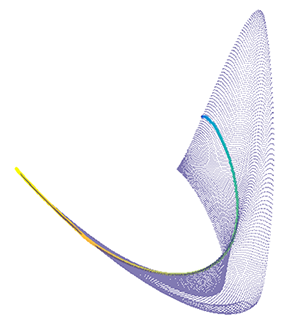About
 The Department of Computational Mathematics, Science and Engineering (CMSE) is unique among computational academic units nationally; it is the first to comprehensively
treat computation as the "triple junction" of algorithm development and analysis,
high performance computing, and applications to scientific and engineering modeling
and data science. This approach recognizes computation as a new discipline rather
than being decentralized into isolated sub-disciplines. CMSE, jointly administered
by the College of Natural Science and the College of Engineering, will enable application-driven computational modeling (“pull”), while also exposing
disciplinary computational scientists to advanced tools and techniques (“push”), which
will ignite new transformational connections in research and education.
The Department of Computational Mathematics, Science and Engineering (CMSE) is unique among computational academic units nationally; it is the first to comprehensively
treat computation as the "triple junction" of algorithm development and analysis,
high performance computing, and applications to scientific and engineering modeling
and data science. This approach recognizes computation as a new discipline rather
than being decentralized into isolated sub-disciplines. CMSE, jointly administered
by the College of Natural Science and the College of Engineering, will enable application-driven computational modeling (“pull”), while also exposing
disciplinary computational scientists to advanced tools and techniques (“push”), which
will ignite new transformational connections in research and education.

Overview
The Department of Computational Mathematics, Science and Engineering (CMSE) is focused on applications that are aligned with experimental expertise at Michigan State University. CMSE is targeting applications in the physical, biological and engineering sciences. CMSE faculty members focus on the science of algorithm development, as key methods developed in this area bridge many application core areas in science.
The new department is actively working on developing a blended environment for science, where roughly half of the faculty members are viewed as generalists working on the science of general numerical methods, and the other half are focused on the development of new methods in a targeted application area.
Further, the department has a second key component to its blended personality–half of its faculty focuses on the development of new methods in data science, and the other half concentrates on the development of scalable methods in scientific computing.
A Brief Overview of Data Science

Data science focuses on the development of tools designed to find trends within datasets that help scientists who are challenged with massive amounts of data to assess key relations within those datasets. These key relations provide hooks that allow scientists to identify models which, in turn, facilitate making accurate predictions in complex systems. For example, a key data science goal on the biological side would be better care for patients (e.g., personalized medicine). Given a patient’s genetic makeup, the proper data-driven model would identify the most effective treatment for that patient.
A Brief Overview of Scientific Computing

Scientific computing focuses on the development of predictive computer models of the world around us. As study of physical phenomena through experimentation has become impossible, impractical and/or expensive, computational modeling has become the primary tool for understanding—equal in stature to analysis and experiment. Although we can now design an entire commercial aircraft through simulation alone (e.g., the Boeing 777), there are many fundamental problems in science and engineering that are beyond the scope of modern computers with current computational methods. The discipline of scientific computing is the development of new methods that make challenging problems tractable on modern computing platforms, providing scientists and engineers with key windows into the world around us.
Overview of Educational Goals
A significant aspect of CMSE is the ability to offer new educational opportunities that are aligned with the needs of a 21st century workforce. Many companies and our national labs are seeking individuals who have knowledge of both a specific discipline and computational modeling.
Currently, CMSE offers an undergraduate major in Data Science and an undergraduate minor in Data Science (jointly with the Department of Computer Science and Engineering and Department of Statistics and Probability), as well as an undergraduate minor in Computational Mathematics, Science and Engineering. Likewise, CMSE has a vibrant graduate program with certificate PhD programs. All of these programs are designed to teach students computational thinking and build data acumen —i.e., our students will be expressly educated in the use of data-driven computing to model and study the world around them. Students in CMSE degree programs will achieve a high degree of proficiency in model development, critical thinking and analysis.